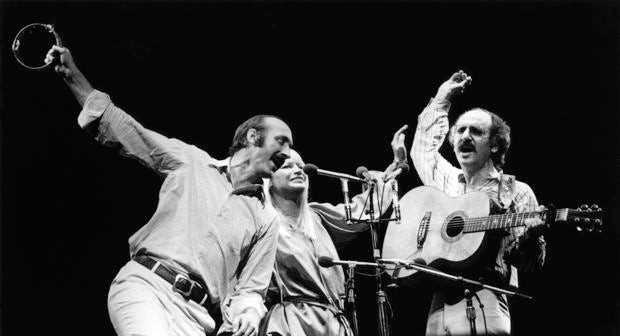Peter Yarrow, the resonant tenor voice and socially conscious songwriter who formed one-third of the legendary folk trio Peter, Paul and Mary, has passed away at the age of 86. His publicist, Ken Sunshine, confirmed to CBS News that Yarrow died on Tuesday in New York after a four-year battle with bladder cancer. Yarrow’s harmonies, alongside Mary Travers and Noel Paul Stookey, became anthems for a generation, echoing through the civil rights movement and anti-war protests of the 1960s and beyond.
Yarrow’s daughter, Bethany, poignantly captured his spirit in a statement: “Our fearless dragon is tired and has entered the last chapter of his magnificent life. The world knows Peter Yarrow the iconic folk activist, but the human being behind the legend is every bit as generous, creative, passionate, playful, and wise as his lyrics suggest.” The passing of Peter Yarrow marks the end of an era for folk music and for many who were deeply moved by the music of Peter, Paul and Mary.
The Rise of Peter, Paul and Mary: Folk Music Pioneers
Formed in the vibrant Greenwich Village folk scene of the early 1960s, Peter, Paul and Mary quickly rose to prominence, becoming synonymous with the folk revival movement. Manager Albert Grossman, seeking to create a group to rival the popular Kingston Trio, brought together Peter Yarrow, Noel Paul Stookey, and Mary Travers. Yarrow, with his folk music background and connections in the Village, suggested Stookey, a comedic performer he knew. Stookey, in turn, was acquainted with Travers, a singer with prior performing experience, including work with Pete Seeger.
The trio’s initial rehearsals revealed an immediate vocal chemistry. Yarrow recounted their first performance together, humorously noting Stookey’s unfamiliarity with folk standards. Despite this, their voices blended seamlessly, leading to their rapid ascent. Peter, Paul and Mary’s self-titled debut album in 1962 was an instant success, reaching No. 1 on the Billboard chart. This was followed by a string of hit albums, including “In the Wind” and “Moving,” solidifying their place as folk music icons. Their remarkable run in the 1960s produced six Billboard Top 10 singles, two No. 1 albums, and garnered them five Grammy Awards.
Peter, Paul and Mary’s Enduring Musical Legacy
Peter, Paul and Mary were instrumental in popularizing folk music and bringing it to a mainstream audience. They achieved this not only through their own original songs but also by interpreting and championing the works of other songwriters. Notably, they were early champions of Bob Dylan, turning his songs “Don’t Think Twice, It’s All Right” and “Blowin’ in the Wind” into Top 10 hits. Their rendition of “Blowin’ in the Wind” resonated deeply with the burgeoning civil rights movement, and they famously performed it at the 1963 March on Washington, the same event where Martin Luther King Jr. delivered his iconic “I Have a Dream” speech.
Beyond protest songs, Peter, Paul and Mary showcased a softer, more introspective side with songs like “Puff the Magic Dragon.” Co-written by Peter Yarrow and Leonard Lipton, “Puff the Magic Dragon” became one of their most beloved songs, though it was often misinterpreted as having drug references. Yarrow consistently refuted these interpretations, explaining that the song is about the bittersweet loss of childhood innocence. He poignantly described the song’s core message: “A dragon lives forever, but not so little boys.” Another major hit for the group was their 1969 cover of John Denver’s “Leaving on a Jet Plane,” which became their last No. 1 single before the trio decided to pursue solo projects in 1970.
Reunion and Continued Impact Beyond Peter, Paul and Mary
After an eight-year hiatus, Peter, Paul and Mary reunited in 1978 for a benefit concert organized by Yarrow, “Survival Sunday,” focused on anti-nuclear activism. This reunion proved to be more than just a one-off performance; it marked the rekindling of their musical partnership, which continued until Mary Travers’ death in 2009. Even after Travers’ passing, the enduring power of Peter, Paul and Mary’s music lived on as Yarrow and Stookey continued to perform both individually and together, keeping the spirit of their iconic trio alive for generations of fans.
Peter Yarrow’s commitment to social justice extended far beyond his work with Peter, Paul and Mary. He remained a passionate activist throughout his life, using his music and platform to advocate for civil rights, peace, and education. His legacy as a musician and activist is intertwined with the history of Peter, Paul and Mary, a group whose music not only entertained but also inspired and moved people to action. Peter Yarrow’s contributions to music and society will be remembered and celebrated for years to come, ensuring that the harmonies of Peter, Paul and Mary continue to resonate.
